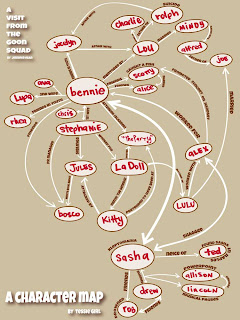The (Rules) of Writing
The first rule of writing is there are no rules of writing.
That's clever, but not exactly true. The word I probably hear the most from other writers is 'rules.' It's also the most political aspect of writing as well; usually the subject falls along one of three lines:
1) No third-person omniscient.
I'll be honest - I'm not sure if this is actually a rule. As the article points out, the omniscient perspective has long been the default perspective in most fiction. Maybe it's not fashionable any more, but fashion is most often momentary; writing never should be. It depends entirely on the type of story you're telling, and how you want to tell it; if you're writing grand space opera or major fantasy, you probably don't want to limit yourself to a single first person narrator, which will limit the scope. But then you can see by what George R.R. Martin is doing in A Game of Thrones, and you see immediately why rules are only rules until someone decides they're not.
The Book of Elizabeth employs the third person omniscient, as most of my work does. In my work in progress, the SciFiJohnHughesNovel, I'm using the first person. The novel takes place on an alien world over the course of a single night; I could have chosen to create more distance, and see more of the world/plot/backstory, but in this instance this is one character's story, and I wanted her to be the lens we saw this world through. She is a reflection of it, as it is of her.
You're never limited to one or the other, though. There are numerous examples of novels that employ varying points of view simultaneously. Frankenstein is a great example of shifting first person narrators; the book follows a succession of storytellers that nests the overall plot.
When choosing which point of view you're going to use, you have to consider the pros and cons of each. David Madden's Revising Fiction, which I've discussed here before, will help guide you in making that decision. And there are cons to the third person, the biggest of which is typically a tenedency towards excess. Since the narrator knows all, they can sometimes tell all, and that isn't necessarily a good thing. An omniscient narrator also allows for explicit authorial commentary, and even judgment. This is generally what modern writers object to with the third person. Objectivity is essential when telling a story this way; let the facts and the story itself make whatever case needs to be made.
Next time I'll discuss whether to prologue or not to prologue.
That's clever, but not exactly true. The word I probably hear the most from other writers is 'rules.' It's also the most political aspect of writing as well; usually the subject falls along one of three lines:
- There are no rules.
- There are, and these are the ones you never break (Show, don't tell).
- You have to know the rules before you can break them.
1) No third-person omniscient.
I'll be honest - I'm not sure if this is actually a rule. As the article points out, the omniscient perspective has long been the default perspective in most fiction. Maybe it's not fashionable any more, but fashion is most often momentary; writing never should be. It depends entirely on the type of story you're telling, and how you want to tell it; if you're writing grand space opera or major fantasy, you probably don't want to limit yourself to a single first person narrator, which will limit the scope. But then you can see by what George R.R. Martin is doing in A Game of Thrones, and you see immediately why rules are only rules until someone decides they're not.
The Book of Elizabeth employs the third person omniscient, as most of my work does. In my work in progress, the SciFiJohnHughesNovel, I'm using the first person. The novel takes place on an alien world over the course of a single night; I could have chosen to create more distance, and see more of the world/plot/backstory, but in this instance this is one character's story, and I wanted her to be the lens we saw this world through. She is a reflection of it, as it is of her.
You're never limited to one or the other, though. There are numerous examples of novels that employ varying points of view simultaneously. Frankenstein is a great example of shifting first person narrators; the book follows a succession of storytellers that nests the overall plot.
When choosing which point of view you're going to use, you have to consider the pros and cons of each. David Madden's Revising Fiction, which I've discussed here before, will help guide you in making that decision. And there are cons to the third person, the biggest of which is typically a tenedency towards excess. Since the narrator knows all, they can sometimes tell all, and that isn't necessarily a good thing. An omniscient narrator also allows for explicit authorial commentary, and even judgment. This is generally what modern writers object to with the third person. Objectivity is essential when telling a story this way; let the facts and the story itself make whatever case needs to be made.
Next time I'll discuss whether to prologue or not to prologue.


Comments
Most "rules" really are about someone having a firm handle on something before they do it.
The issue with third-person omniscient lately I've seen a lot, isn't that I object to it because it's unfashionable (I like plenty of 3rd omni books), but more that a lot of people, to be blunt, can't do it well. They confuse head-hopping with 3rd-person omni.
Third person omniscient, after all, involves a certain consistency of narrative voice. I've seen a lot of writers basically say, "I'm writing in 3rd omni" but really all they are doing is jumping 3rd limited perspectives. There's no consistency in voice. There's no actual omniscience.
It's disorienting. Sure, there certain types of books where one might want that, but in most cases what I'm seeing seems to just be people who don't have a firm handle on POV.
The net result is character interface whiplash that dramatically undercuts the ability of the reader to interface with the material.
That's not to say there aren't successful authors who do it, but in general, it makes for less engaging writing.
It's the difference between say the way POV is treated by Patrick O'Brian and Nicholas Sparks.
Honestly, I usually see (and personally register) objections more on that basis than strong concerns about authorial intrusion. Granted, I swim in very genre-oriented circles, that may be the case.